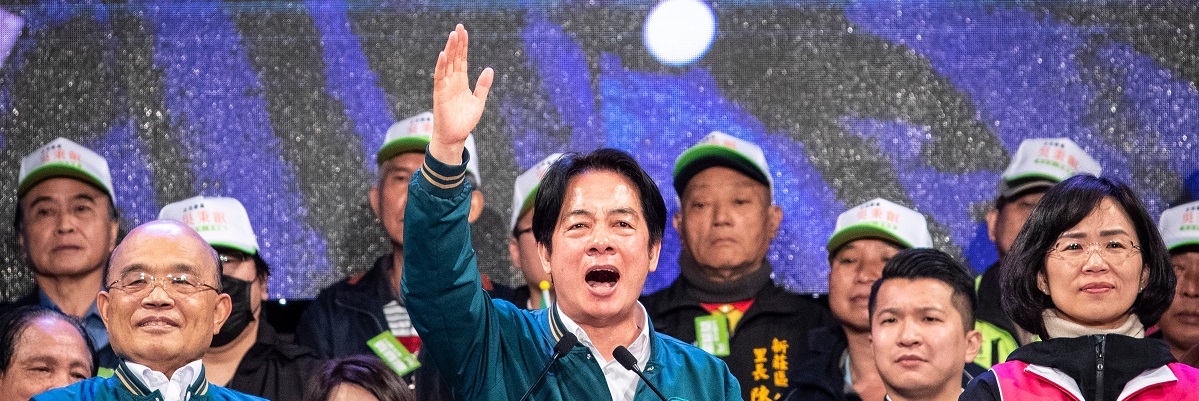Diplomacy
Taiwan's national elections: a question of world order

Image Source : Shutterstock
Subscribe to our weekly newsletters for free
If you want to subscribe to World & New World Newsletter, please enter
your e-mail
Diplomacy

Image Source : Shutterstock
First Published in: Jan.15,2024
Feb.08, 2024
In an ideal world, Taiwan's national elections would have nothing to do with China or the United States, let alone the relationship between these two countries. However, the victory of Lai Ching-te, hitherto the vice-chairman of the Democratic Progressive Party (DPP) government, a candidate who enjoys no sympathy from Beijing, has implications for China-Taiwan and China-US relations. In any case, the DPP's victory has not guaranteed it an absolute majority - in a chamber composed of 113 seats, the vote for the DPP fell from 61 to 51 (because of the poor economic situation) - and it will be forced to negotiate a coalition government. Taiwan's national elections are a matter of world order mainly because one of Xi Jinping's policy priorities is the "historical inevitability" of "unification" between China and Taiwan. If Xi fulfills his ambition, changing the borders and territorial integrity of a country through military force, it would be a flagrant violation of the international liberal order. Given U.S. President Joe Biden's promise - that Washington would defend Taiwan if invaded by China - "reunification" would provoke a war between the two powers, between revisionist and authoritarian China and the United States, the country that has created, sustained and led the international order after World War II. While Western politicians and analysts argue that China, as a revisionist power, increasingly poses a threat to the stability of the region and the international liberal order, for Taiwan it is an existential issue. The successful consolidation of Taiwan's democracy in recent decades has intensified the growth of a distinct Taiwanese identity. As the political systems of China and Taiwan continue to diverge, there is little support on the island for "unification." Taiwan is increasingly anchored to the West and its population is broadly in favor of strengthening relations with liberal democracies, especially Japan, the United States and Europe. From the beginning of the campaign, all three candidates - DPP's Lai, Hou Yu-ih of the Kuomintang (KMT), which increased its number of legislators from 38 to 52, and Ko Wen-je of the Taiwan People's Party (TPP), which has won 8 seats - expressed that the priority of their foreign and domestic policies would be to preserve Taiwan's de facto independence and peace with China. However, their strategies to achieve this are divergent. The strategy of Lai, the candidate who won the election, is to strengthen political, military and economic ties with the United States and its allies; while Hou and Ko intended to restart the dialogue with Beijing, which China interrupted after the inauguration of President Tsai Ing-wen in 2016 (William Lai's predecessor, who served two presidential terms at the helm of the country). The new government, possibly a coalition between the DPP and KMT, will be rocked by debates over increased Defense spending. KMT politicians disagree with the DPP on the details of military strategy and what weapons to procure from the United States. In 2022, Washington and Taipei launched an ambitious trade initiative as well as security cooperation. Thus, Washington increased the number of troops deployed in Taiwan to train its military and expanded the training of Taiwanese soldiers in the United States. The new president faces economic problems that have undermined the popularity of the ruling DPP. But undoubtedly his biggest problem is relations with China. Strengthening Taiwan's defenses and minimizing Beijing's provocations-which are likely to increase in the form of military maneuvers and economic pressures-will remain the DPP's policy priorities in Taiwan. However, it does not seem clear that the DPP has a clear strategy for dealing with Xi Jinping's possible decisions. Xi is unlikely to conclude that he can tolerate Taiwan's trajectory. Lai's victory has deeply irritated the Chinese Communist Party. The election results can be read in the key of a referendum on Taiwan-China relations. Beijing has lost it to the United States. Peaceful "unification" is becoming less and less viable. Rather, there are signs that the Chinese Communist Party perceives that the trend in Taipei-Beijing relations is not moving in Beijing's favor. As a result, Xi may take the decision to act to achieve unification. Xi has stated that the Taiwan issue cannot be passed on to future generations and that achieving unification is the essence of the country's rejuvenation. "Historical inevitability" may turn into practical decision - use of military force - given China's unsatisfactory economic situation. Xi may try to make unification an important part of his political legacy. The outcome of the Taiwan election will not influence Xi Jinping's decisions. The results confirm a status quo in Taiwanese politics - the continuity of the DPP government - but it means increased pre-war tensions between Taiwan and China, as well as between China and the United States.
First published in :

FAES Analysis Group
Unlock articles by signing up or logging in.
Become a member for unrestricted reading!